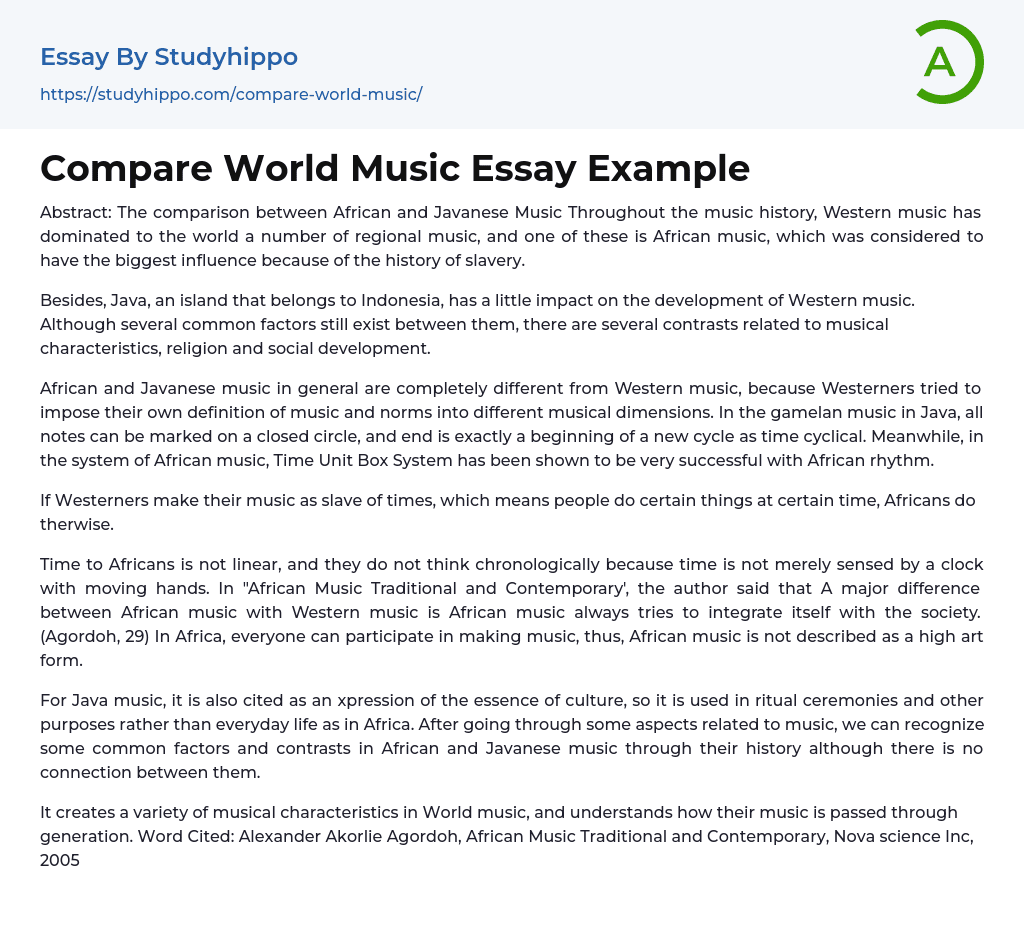Abstract: The comparison between African and Javanese Music Throughout the music history, Western music has dominated to the world a number of regional music, and one of these is African music, which was considered to have the biggest influence because of the history of slavery.
Besides, Java, an island that belongs to Indonesia, has a little impact on the development of Western music. Although several common factors still exist between them, there are several contrasts related to musical characteristics, religion and social development.
African and Javanese music in general are completely different from Western music, because Westerners tried to impose their own definition of music and norms into different musical dimensions. In the gamelan music in Java, all notes can be marked on a closed circle, and end is exactly
...a beginning of a new cycle as time cyclical. Meanwhile, in the system of African music, Time Unit Box System has been shown to be very successful with African rhythm.
If Westerners make their music as slave of times, which means people do certain things at certain time, Africans do therwise.
Time to Africans is not linear, and they do not think chronologically because time is not merely sensed by a clock with moving hands. In "African Music Traditional and Contemporary', the author said that A major difference between African music with Western music is African music always tries to integrate itself with the society. (Agordoh, 29) In Africa, everyone can participate in making music, thus, African music is not described as a high art form.
For Java music, it is also cited as an xpression of the essence of culture, so it i
used in ritual ceremonies and other purposes rather than everyday life as in Africa. After going through some aspects related to music, we can recognize some common factors and contrasts in African and Javanese music through their history although there is no connection between them.
It creates a variety of musical characteristics in World music, and understands how their music is passed through generation. Word Cited: Alexander Akorlie Agordoh, African Music Traditional and Contemporary, Nova science Inc, 2005
- Russian Empire essays
- Ancient Greece essays
- British Empire essays
- Historical Figures essays
- Nazi Germany essays
- Roman Empire essays
- War essays
- Revolution essays
- 19Th Century essays
- Historiography essays
- History of the United States essays
- 20Th Century essays
- World History essays
- Vikings essays
- Declaration of Independence essays
- Civilization essays
- Evidence essays
- Genocide essays
- Colonialism essays
- Rebellion essays
- 1960S essays
- 1920S essays
- 1950S essays
- Letter from Birmingham Jail essays
- Louisiana Purchase essays
- The Columbian Exchange essays
- World Hunger essays
- What is History essays
- Bravery essays
- Gilded Age essays
- Vladimir Lenin essays
- Alexander The Great essays
- Sparta essays
- Victorian Era essays
- Henry v essays
- Stonehenge essays
- Frederick Douglass essays
- Mahatma Gandhi essays
- Joseph Stalin essays
- Geert Hofstede essays
- George Eliot essays
- Ginevra King essays
- John Keats essays
- Siegfried Sassoon essays
- Ben jonson essays
- Billy elliot essays
- Wilkie collins essays
- John Proctor essays
- Harriet Tubman essays
- Napoleon essays




